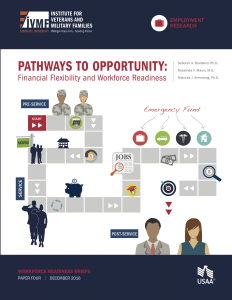
Authors:
- Deborah A. Bradbard, Ph.D.
- Rosalinda V. Maury, M.S.
- Nicholas J. Armstrong, Ph.D.
Published: December 20, 2016
Financial preparation is an often overlooked component of a service member’s transition from the military.
Service members who are financially unprepared for transition, at best, limit their ability to respond to new opportunities, and, at worse, risk their (and possibly their family’s) long-term economic well-being from employment gaps or unforeseen emergencies. By comparison, those who are financially ready for their transition will have greater flexibility to make critical choices—related to employment, advanced training, education, relocation, and more—that will have lasting effects on their lives, for better or for worse.
Still, most service members and veterans face atypical financial circumstances—both assets and liabilities—that affect their financial outlook differently than the average person making a career change. Thus, the goal for any service member is to maximize their range of options in transition by capitalizing on their unique assets (education benefits, intangible leadership skills, etc.) and limiting potential liabilities (limited professional network, advanced education or training) through sound financial preparation.
This report, the fourth in a series focused on workforce readiness for veterans, shares insights for financial success before, during, and after military life.
